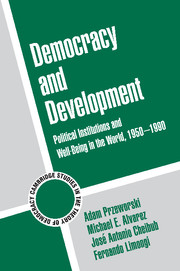Book contents
- Frontmatter
- Contents
- List of Tables and Figures
- Acknowledgments
- Introduction
- 1 Democracies and Dictatorships
- 2 Economic Development and Political Regimes
- 3 Political Regimes and Economic Growth
- 4 Political Instability and Economic Growth
- 5 Political Regimes and Population
- Conclusion
- Appendix I Selection Model
- Appendix II Codebook
- References
- Author Index
- Country Index
- Subject Index
3 - Political Regimes and Economic Growth
Published online by Cambridge University Press: 05 June 2012
- Frontmatter
- Contents
- List of Tables and Figures
- Acknowledgments
- Introduction
- 1 Democracies and Dictatorships
- 2 Economic Development and Political Regimes
- 3 Political Regimes and Economic Growth
- 4 Political Instability and Economic Growth
- 5 Political Regimes and Population
- Conclusion
- Appendix I Selection Model
- Appendix II Codebook
- References
- Author Index
- Country Index
- Subject Index
Summary
Introduction
With the birth of new nations in Asia and Africa, the fear that democracy would undermine economic growth began to be voiced in the United States. The first statements to that effect were perhaps those by Walter Galenson and by Karl de Schweinitz, who argued, both in 1959, that in poor countries democracy unleashes pressures for immediate consumption, which occurs at the cost of investment, hence of growth. Galenson mentioned both the role of unions and that of governments. He thought that unions “must ordinarily appeal to the worker on an all-out consumptionist platform. No matter how much ‘responsibility’ the union leader exhibits in his understanding of the limited consumption possibilities existing at the outset of industrialization, he cannot afford to moderate his demands.” As for governments, he observed that “the more democratic a government is, … the greater the diversion of resources from investment to consumption.” According to de Schweinitz (1959: 388), if trade unions and labor parties “are successful in securing a larger share of the national income and limiting the freedom for action of entrepreneurs, they may have the effect of restricting investment surplus so much that the rate of economic growth is inhibited.” That argument enjoyed widespread acceptance under the influence of Huntington, who claimed that “the interest of the voters generally leads parties to give the expansion of personal consumption a higher priority via-à-vis investment than it would receive in a non-democratic system” (Huntington and Domiguez 1975: 60; Huntington 1968).
- Type
- Chapter
- Information
- Democracy and DevelopmentPolitical Institutions and Well-Being in the World, 1950–1990, pp. 142 - 186Publisher: Cambridge University PressPrint publication year: 2000
- 1
- Cited by

